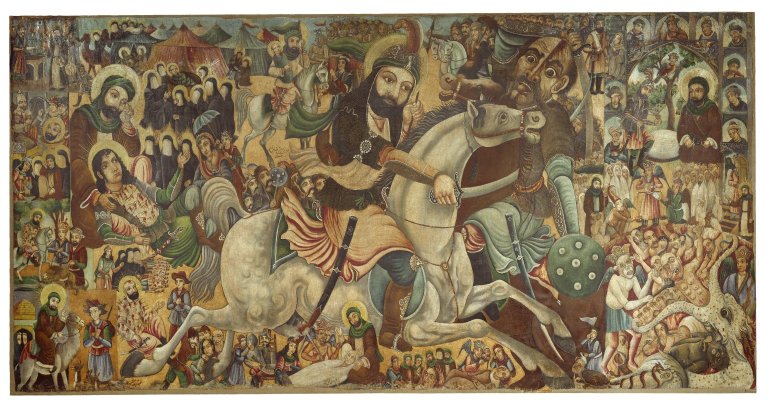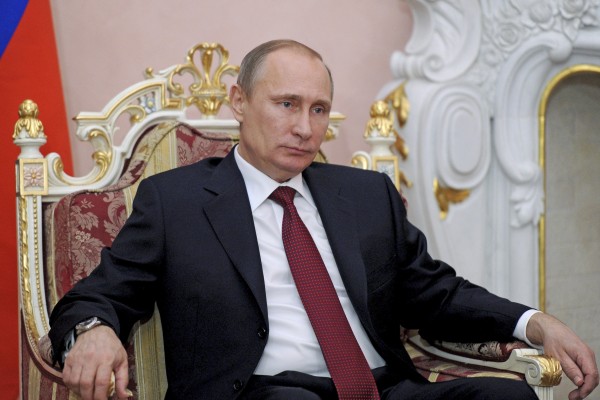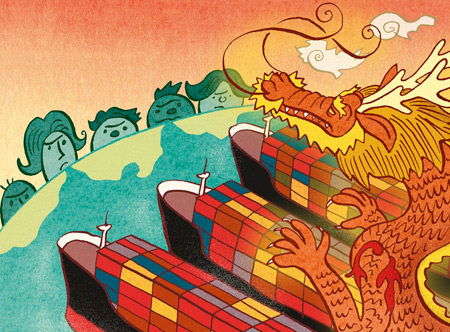Husayn ibn Ali was born in 620 AD to a family famed for their values of equality, love and peace. Raised by his grandfather Muhammad (the last prophet of Islam), Husayn was a figure known for his integrity, generosity of spirit and blindness to colour, social class and personal beliefs. It was for this reason that people flocked to him and his family.
A Breaking Society: The Shia Version
Not long after the passing of Muhammad, the leadership of the vast Arab Empire had fallen into the hands of the corrupt. The morality that Muhammad had spent his life instilling into society was slowly eradicated as the new ruler, Yazid, from the Ummayad dynasty, was hell-bent on gaining complete control in a quest for power.
Husayn witnessed the fundamental human rights of his fellow citizens being usurped. He knew something had to be done. Yazid ruled with an iron fist. He demanded Hussain pay him an oath of allegiance, to lend credibility to his brutal rule.
Calligraphy in Arabic depicting Husayn.
It was now that Husayn faced his dilemma. Should he give his oath of allegiance to a vicious despot – and stand aside as the people around him were being oppressed? Or should he take a stand and risk great personal loss? The timeless words of his grandfather echoed in his heart and Husayn knew what to do:
“The greatest stand is to speak the word of truth in the face of a tyrant.”
Political Conflict in the New Islamic World
Whilst Husayn was determined not to bow down to a tyrant, he did not want to be responsible for conflict or the inevitable bloodshed that would ensue. He decided to relocate with his whole family to the holy city of Mecca. Surely, he thought, Yazid and his henchmen would respect this city and avoid confrontation.
But Yazid’s threats of violence continued, and Hussain was invited to Kufa – a town in modern-day Iraq – by his supporters and friends who lived there. Setting out for Kufa with his family and close companions, Hussain aimed to avoid conflict at all costs. His message was simple:
“I will never give Yazid my hand like a man who has been humiliated, nor will I flee like a slave… I have not risen to spread evil or to show off – nor for spreading immorality or oppression. Rather, I have left to restore the teachings of my grandfather Muhammad… And I only desire to spread good values and prevent evil…”
Husayn’s Sacrifice
En route to Kufa, Husayn received news that Yazid’s forces had threatened the people into withdrawing their support for him. Husayn, his family and his companions were alone with no support. Yet Husayn was a man of principles – he would never give up his mission and bow to tyranny. Yazid ordered an army of over 30,000 to block him from moving any further east. Husayn’s caravan was forced to stop in the middle of the scorching desert of Karbala, Iraq. The end was drawing close.

“Battle of Karbala” by Abbas Al-Musavi.
The next day, under the blazing sun and searing heat, Yazid’s battle drums were sounded and orders were given to the army to attack and kill Husayn at any cost. Husayn’s army of approximately 100 men stood in front of an army of 30,000; the odds were impossible. That night, Husayn assembled his companions and pleaded with them to leave him and save themselves. They refused to leave their leader, declaring that they would prefer to stay and face the inevitable with him on the path of truth and justice. They took comfort in defending a noble cause.
Till the very end, Husayn had the opportunity to return home in peace – all he had to do was sign a simple oath of allegiance. Indeed, the commander of the opposing army pleaded with him several times to convince him to do so. This was however not an option for him.
Shortly afterwards, the now 70,00-strong army encircled Husayn and despite a valiant effort, Husayn, his family, and his supporters were ruthlessly killed. It was the tenth day of the first month of the Islamic New Year, the 10th of Muharram 680 AD, Ashura day.
Campaigns like “Who is Hussain?” seek to revive the memory of one of the Islam’s greatest moral teachers and examples.
The Legacy of Husayn
Through this heroic act of sacrifice, he set an example for millions around the world. Among them were heroic civil rights leaders like Gandhi, who, during his non-violent movement against British rule stated: “I learned from Hussain how to be wronged and be a winner, I learnt from Husayn how to attain victory while being oppressed.”
Ashura is time of introspection and internal contemplation, a time of rededication to the spirit of Husayn. Shias all over the world reflect upon and reject elements of their lives that mirror the uncivilized tendencies of oppression. And they vow to become more like Husayn in their principles and in their actions.
In many societies, like Europe and North America, a custom has developed of setting up blood donation centers in the name of Husayn. Donors give with the sole purpose of helping others who need it. This is just one way in which the sacrifice of Husayn has come to embody integrity and compassion and become a symbol for courage, selflessness and humanity — even in the Western world.
Hussain is a role model not just for Shias; his spirit lives on forever in the human conscience. The way he lived and the way he died show us the value he placed on morality and honour. His true purpose of existence – the perfection of our morals and ethics, a lesson for every human being. In his parting words, Hussain summed up his struggle beautifully:
“Death with dignity is better than a life of humiliation”.
Graphite would like to thank the “Who is Hussain?” campaign for the content of this article. The campaign “is dedicated towards informing the world about an inspirational man called Hussain: his morals, his actions and moreover his compassion for those around him.”






